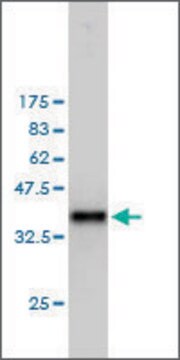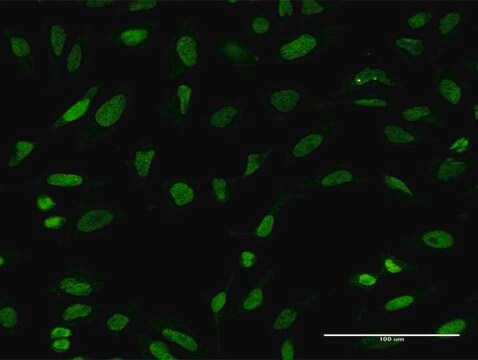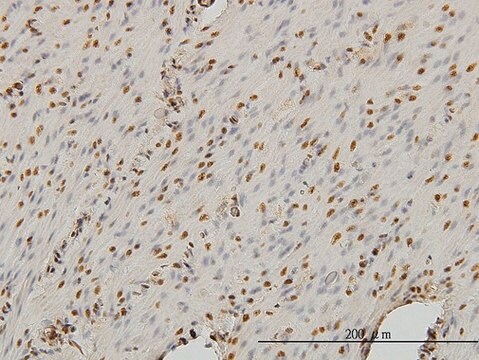WH0009232M1
Monoclonal Anti-PTTG1 antibody produced in mouse
clone 1D9, purified immunoglobulin, buffered aqueous solution
Synonym(s):
Anti-EAP1, Anti-HPTTG, Anti-PTTG, Anti-SECURIN, Anti-TUTR1, Anti-pituitary tumor-transforming 1
About This Item
biological source
mouse
Quality Level
conjugate
unconjugated
antibody form
purified immunoglobulin
antibody product type
primary antibodies
clone
1D9, monoclonal
form
buffered aqueous solution
species reactivity
human
technique(s)
indirect ELISA: suitable
western blot: 1-5 μg/mL
isotype
IgGκ
Related Categories
1 of 4
This Item | SAB1409988 | WH0005324M2 | WH0010274M1 |
|---|---|---|---|
| biological source mouse | biological source mouse | biological source mouse | biological source mouse |
| clone 1D9, monoclonal | clone 3F9, monoclonal | clone 3B7, monoclonal | clone 2E9, monoclonal |
| conjugate unconjugated | conjugate unconjugated | conjugate unconjugated | conjugate unconjugated |
| Gene Information human ... PTTG1(9232) | Gene Information human ... PTTG1(9232) | Gene Information human ... PLAG1(5324) | Gene Information human ... STAG1(10274) |
| species reactivity human | species reactivity human | species reactivity human | species reactivity human |
General description
Immunogen
Sequence
MATLIYVDKENGEPGTRVVAKDGLKLGSGPSIKALDGRSQVSTPRFGKTFDAPPALPKATRKALGTVNRATEKSVKTKGPLKQKQPSFSAKKMTEKTVKA
Physical form
Legal Information
Disclaimer
Not finding the right product?
Try our Product Selector Tool.
Storage Class Code
10 - Combustible liquids
Flash Point(F)
Not applicable
Flash Point(C)
Not applicable
Personal Protective Equipment
Certificates of Analysis (COA)
Search for Certificates of Analysis (COA) by entering the products Lot/Batch Number. Lot and Batch Numbers can be found on a product’s label following the words ‘Lot’ or ‘Batch’.
Need A Sample COA?
This is a sample Certificate of Analysis (COA) and may not represent a recently manufactured lot of this specific product.
Already Own This Product?
Find documentation for the products that you have recently purchased in the Document Library.
Our team of scientists has experience in all areas of research including Life Science, Material Science, Chemical Synthesis, Chromatography, Analytical and many others.
Contact Technical Service


